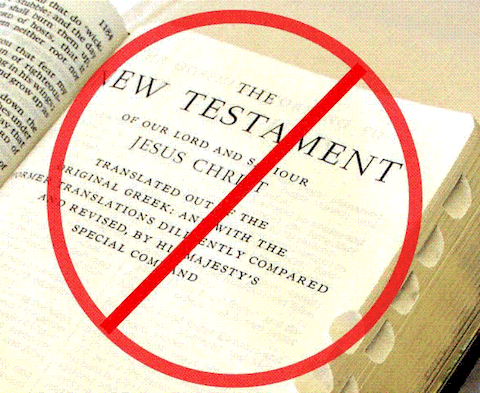
1001 Errors in the Christian Bible
Home
Dedication
Matthew
Mark
Luke
John
Acts
Contact Us
Luke -- Errors 308-314
#308
Luke 2: (KJV)
29 “Lord, now lettest thou thy servant depart in peace, according
to thy word:”
I thought long and hard about this one. The underlying Greek word for
“servant” above has a primary meaning of “slave” which
fits the general context of the time period as well as the specific context
of the verse. “depart in peace” is a euphemism for die and the
meaning is to finally release a slave from bondage before dying. The modern
translations are afraid to use “slave” because of the modern
connotations associated with the word. Also, from now on the author of
Luke will be known as “Flounder”.
#309
Luke 2: (KJV)
33 “And Joseph and his mother marvelled at those things which
were spoken of him.”
“Joseph” above is a mistranslation. The Greek word is “father”.
There isn’t even any significant textual variation here. Obviously,
Christian translators had a problem identifying Joseph as the father of
someone who supposedly had a virgin birth. A majority of modern Christian
translations have “Joseph” including comically Young’s
Literal.
#310
Luke 2: (KJV)
48 “And when they saw him, they were amazed: and his mother said
unto him, Son, why hast thou thus dealt with us? behold, thy father and
I have sought thee sorrowing.”
“Luke” is supposed to be the Gospel author with the good grammar
but he makes a grammatical error here. “they were amazed” above
is followed by the conjunctive “and”
then the verb “said” indicating it was the “they”
who will then say something but it’s only the mother who says something.
#311
Luke 2: (KJV)
48 “And when they saw him, they were amazed: and his mother said
unto him, Son, why hast thou thus dealt with us? behold, thy father and
I have sought thee sorrowing.
49 And he said unto them, How is it that ye sought me? wist ye not that
I must be about my Father's business?”
Jesus secretly escapes from his mother and Joseph/father/parent/mother’s
husband and is missing for three days. When they locate him and tell him
they were worried he tells them it’s all their fault. I’ve never
seen a Christian commentator offer this explanation (probably because
they tend to avoid this area of Luke because of the errors) but “Luke”
is likely foreshadowing the supposed resurrection by having Jesus “missing”
for three days and then found safe and sound. One of the consequences
though is a violation of the commandment to honor mother and father. R-e-s-p-e-c-t.
#312
Luke 2: (KJV)
46 “And it came to pass, that after three days they found him
in the temple, sitting in the midst of the doctors, both hearing them,
and asking them questions.
47 And all that heard him were astonished at his understanding and answers.
48 And when they saw him, they were amazed: and his mother said unto him,
Son, why hast thou thus dealt with us? behold, thy father and I have sought
thee sorrowing.
49 And he said unto them, How is it that ye sought me? wist ye not that
I must be about my Father's business?
50 And they understood not the saying which he spake unto them.”
Compare to Luke 1: (KJV)
35 “And the angel answered and said unto her, The Holy Ghost shall
come upon thee, and the power of the Highest shall overshadow thee: therefore
also that holy thing which shall be born of thee shall be called the Son
of God.”
According to Luke 1:35 Mary is told by an angel (who Mary believes according
to “Luke”) that Jesus will have no father and will be called
“son of God” (KJV’s “the” is a mistranslation).
At a minimum Mary should take this to mean that Jesus is figuratively
the son of God which makes God figuratively Jesus’ father. Yet when
Jesus explains that while they thought he was missing he was doing his
father’s business in the Temple Mary has no idea what he’s talking
about. Did the same “Luke” write 1:35 and 2:46-50? For the Christians
this is the best evidence that Jesus was really Jewish (going into the
family business) although as Archie Bunker explained when Dingbat claimed
that Jesus was Jewish, “only on his mother’s side”.
#313
Luke 3: (KJV)
2 “Annas and Caiaphas being the high priests, the word of God
came unto John the son of Zacharias in the wilderness.”
The Greek reads “At the time of High Priest Annas and Caiaphas”.
“High Priest” is singular. The meaning then is that Annas and
Caiaphas were the High Priest. Modern translations recognize that 1 High
Priest plus 1 High Priest does not equal 1 High Priest (gods though are
a different story) so they are forced to mistranslate “High Priest”
as plural (High Priests) or change the word to “Priesthood”.
#314
Luke 3: (KJV)
2 “Annas and Caiaphas being the high priests, the word of God
came unto John the son of Zacharias in the wilderness.”
As mentioned above “priests” above should be “priest”
in the Greek and Judaism only had one High Priest at a time.